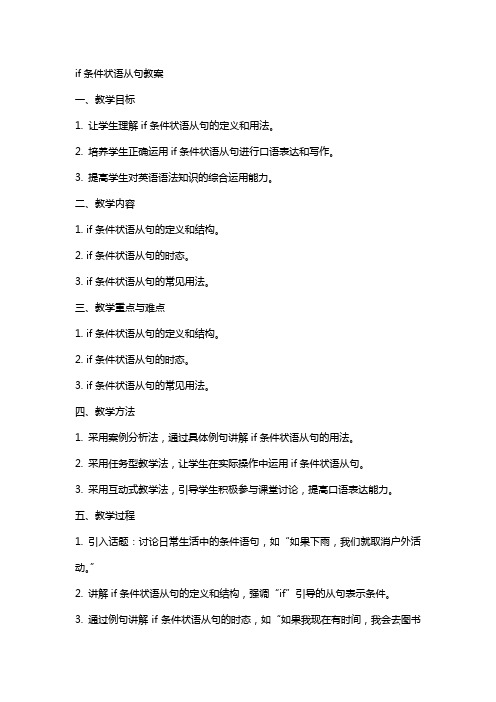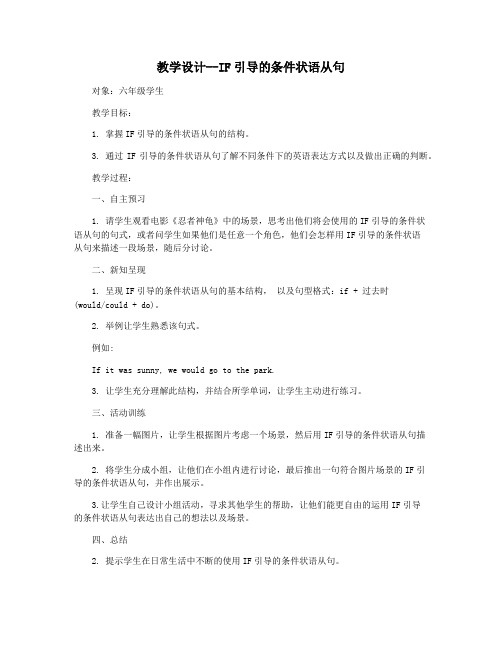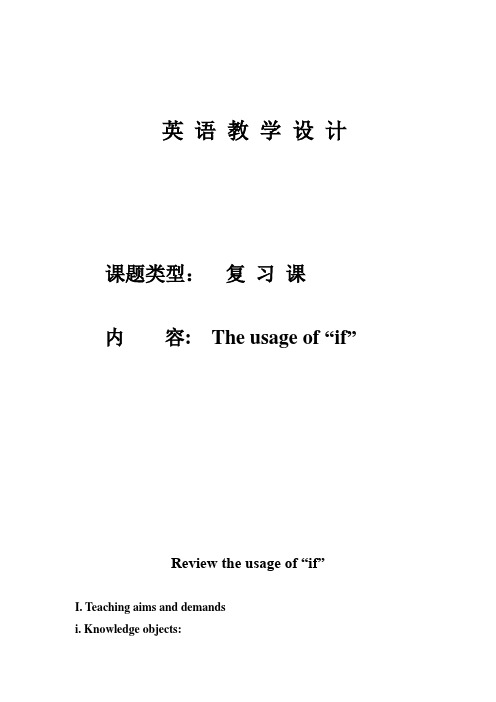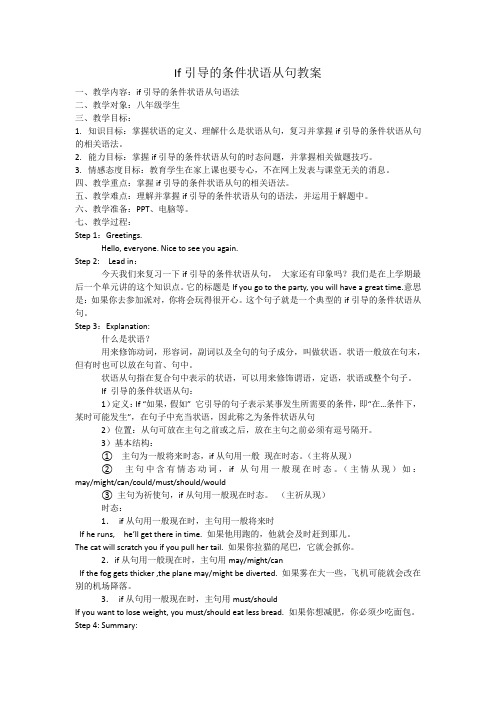if引导的条件状语从句教案资料
if条件状语从句教案

if条件状语从句教案一、教学目标1. 让学生理解if条件状语从句的定义和用法。
2. 培养学生正确运用if条件状语从句进行口语表达和写作。
3. 提高学生对英语语法知识的综合运用能力。
二、教学内容1. if条件状语从句的定义和结构。
2. if条件状语从句的时态。
3. if条件状语从句的常见用法。
三、教学重点与难点1. if条件状语从句的定义和结构。
2. if条件状语从句的时态。
3. if条件状语从句的常见用法。
四、教学方法1. 采用案例分析法,通过具体例句讲解if条件状语从句的用法。
2. 采用任务型教学法,让学生在实际操作中运用if条件状语从句。
3. 采用互动式教学法,引导学生积极参与课堂讨论,提高口语表达能力。
五、教学过程1. 引入话题:讨论日常生活中的条件语句,如“如果下雨,我们就取消户外活动。
”2. 讲解if条件状语从句的定义和结构,强调“if”引导的从句表示条件。
3. 通过例句讲解if条件状语从句的时态,如“如果我现在有时间,我会去图书馆。
”4. 分析if条件状语从句的常见用法,如表示假设、建议、条件等。
5. 进行分组练习,让学生运用if条件状语从句进行口语表达。
6. 布置课后作业:用if条件状语从句编写一段小故事。
教学反思:在教学过程中,要注意引导学生正确理解if条件状语从句的定义和用法,并通过大量例句进行讲解和练习。
要关注学生的个体差异,根据学生的实际情况进行教学调整,确保教学效果的达成。
六、教学评价1. 采用课堂观察法,评价学生在课堂上的参与度和口语表达能力。
2. 通过课后作业,评价学生对if条件状语从句的掌握程度。
3. 进行小组讨论,评价学生之间的合作能力和创新思维。
七、教学拓展1. 引导学生思考if条件状语从句在现实生活中的应用,提高学生的语言运用能力。
2. 介绍其他类型的条件状语从句,如虚拟条件状语从句等,扩大学生的语法知识范围。
3. 组织学生进行相关英语角活动,提高学生的口语交流能力。
教学设计--IF引导的条件状语从句

教学设计--IF引导的条件状语从句对象:六年级学生教学目标:1. 掌握IF引导的条件状语从句的结构。
3. 通过IF引导的条件状语从句了解不同条件下的英语表达方式以及做出正确的判断。
教学过程:一、自主预习1. 请学生观看电影《忍者神龟》中的场景,思考出他们将会使用的IF引导的条件状语从句的句式,或者问学生如果他们是任意一个角色,他们会怎样用IF引导的条件状语从句来描述一段场景,随后分讨论。
二、新知呈现1. 呈现IF引导的条件状语从句的基本结构,以及句型格式:if + 过去时(would/could + do)。
2. 举例让学生熟悉该句式。
例如:If it was sunny, we would go to the park.3. 让学生充分理解此结构,并结合所学单词,让学生主动进行练习。
三、活动训练1. 准备一幅图片,让学生根据图片考虑一个场景,然后用IF引导的条件状语从句描述出来。
2. 将学生分成小组,让他们在小组内进行讨论,最后推出一句符合图片场景的IF引导的条件状语从句,并作出展示。
3.让学生自己设计小组活动,寻求其他学生的帮助,让他们能更自由的运用IF引导的条件状语从句表达出自己的想法以及场景。
四、总结2. 提示学生在日常生活中不断的使用IF引导的条件状语从句。
3. 督促学生在英语学习中遇到不认识的单词,尤其是if介词引导的条件状语从句,把英语知识运用到日常生活中,进而深入学习。
五、考查评估1. 让学生回答真实情景下的IF引导的条件状语从句练习题,检查学生学习IF引导的条件状语从句使用情况,识别出学生学习错误以及正确用语的地方,分析其中的原因。
2. 向学生提出一些问题,如:如果你有5万美元,你可以做什么?结合昨天的课堂,让学生用IF引导的条件状语从句给出答案。
if条件从句 初中教案

if条件从句初中教案1. 知识目标(1)能够理解if条件从句的定义和用法。
(2)能够正确地运用if条件从句表达假设情境。
(3)能够区分if条件从句与其他相关从句的区别。
2. 能力目标(1)能够独立地运用if条件从句进行句子仿写。
(2)能够合作完成if条件从句的练习题。
3. 情感目标培养学生的学习兴趣,提高学生的自主学习能力。
二、教学重点与难点1. 教学重点(1)if条件从句的定义和用法。
(2)if条件从句与其他相关从句的区别。
2. 教学难点(1)if条件从句在实际语境中的运用。
(2)if条件从句的时态和语态。
三、教学过程1. 导入新课利用图片或实物,引导学生思考假设情境,如:“如果今天下雨,我们就不去公园玩耍。
” 让学生说出这个假设情境中的条件和结果,引出if条件从句的概念。
2. 讲解与示范(1)讲解if条件从句的定义:if条件从句是一种表示假设情境的从句,用来描述如果某个条件成立,那么会出现什么样的结果。
(2)讲解if条件从句的用法:在句子中,if条件从句通常放在主句之前,用逗号与主句隔开。
例如:“If it rains, we won't go out.”(3)讲解if条件从句的时态和语态:通常情况下,if条件从句使用一般现在时,主句使用一般将来时。
如果条件从句中的主语与主句中的主语一致,可以从句中省略it is。
例如:“If you come, we will start the meeting.”(4)讲解if条件从句与其他相关从句的区别:例如,假设条件从句(suppose/imagine)、转折条件从句(although/though)等。
3. 练习与巩固(1)让学生独立完成一些if条件从句的练习题,如填空、改写等。
(2)分组合作,让学生运用if条件从句进行句子仿写,如:“如果明天是周末,我们就去游乐园玩。
”4. 拓展与应用让学生运用if条件从句编写一个小故事,可以结合自己的生活经历或想象。
《if 引导的条件状语从句》教案

英语教学设计课题类型:复习课内容: The usage of “if”Review the usage of “if”I. Teaching aims and demandsi. Knowledge objects:1. Review the usage of “ if ”in adverbial clauses of condition2. Review the usage of “if” in subjunctive mood3. Review the usage of “if” in objective clausesii. Ability object:Train students’ speaking abilityiii. Moral object:Make students know more about helping the people in troubleII. Teaching key points1. How to tell the differences among the three situations2. How to do exercises more correctly according to what we reviewed III. Teaching difficult points1. Tell the differences between the usage of “if” i n adverbial clauses of condition and in subjunctive mood2. How to use “if” in these three different situationsIV. Teaching methods1. Sentence chains activity to help2. Competition3. Talk about the picturesV. Teaching aidssome colorful cards, The blackboard , A projectorVI. Teaching proceduresStepI.lead in and review the usage of “if” in adverbial clauses of condition.Listen to a song----“If you’re happy”. Students listen to it a nd summarize the usage of “if” in adverbial clauses of condition.eg, 1. If it rains tomorrow, I won’t go shopping.2. If he is free, he may help you.(use a song to lead in the grammar, students may be interested in it, it also activates the class atmosphere)StepII. Sentence chainDivide the class into two groups, students in each group make sentences using if adverbial clauses of condition one by one, the group can’t follow will lose the game.(Consolidate the usage of “if” in adv erbial clauses of condition) StepIII. Review the usage of “if” in subjunctive moodShow a video of the movie “Da Hua Xi You”. Then let students know the meaning of “if” here is “如果”, but it is impossible, this is the difference between “if” in adverbial clauses of condition and “if” in subjunctive mood. Then sum up the usage of “if” in this situation.eg, 1. If I had one more chance, I would say to the girl “I love you”.2. If I were you, I wouldn’t go.StepIV. Talk about the picturesShow a picture about the earthquake in Japan, then ask students “If you were a student in Japan, what would you do?”. Students talk about this topic using the usage of “if” in subjunctive mood.(Practice the speaking ability using the usage of “if” in subjunctive mood.)StepV. Review the usage of “if” in objective clausesi. S tudents think over the third usage of “if”The meaning of “if” here is “是否”, so it is simple to distinguish it.eg, 1. I don’t know i f he will pass the exam.2. I wonder if you have told the news to Li Lei.ii. S ummarize the usage of “if” in objective clauses.StepVI. ExercisesAfter revision, do some exercises on the screen.(Consolidate the teaching aims in this class)StepVII. GameShow some sentences of “if” of different usage, divide the class into groups of six, and then hand out some colorful cards; students divide the sentences into the correct usage and write the number on the colorful card. The group finishes it most quickly and correctly will win the game and will win the award.(Consolidate what we reviewed in this class.)StepVIII. SummaryIn this class, we reviewed all the usage of “if”, the usage of “if” i n adverbial clauses of condition, the usage of “if” in subjunctive mood, the usage of “if” in objective clauses.StepIX. Homework1.Remember and consolidate what we reviewed today after class bydoing more exercises.2.Preview more about adverbial clauses of condition and objectiveclauses.StepX. Blackboard design。
if引导的条件状语从句教学设计

if引导的条件状语从句教学设计一、教材分析:初中英语语法,梳理总结。
二、教学目标:1、知识目标:学习if引导的条件状语从句。
2、能力目标:运用if引导的条件状语从句作出假设。
3、情感目标:提高学习英语的兴趣及团队合作精神。
三、教学重、难点:重点:if引导的条件状语从句的基本结构。
难点:条件状语从句的主、从句中的时态。
四、教学方法:口头讲授,习题练习五、教学过程:Step1. Lead-inTeacher ask some questions:If you are happy, what will you do?If you have a lot of money, what will you do?Step2. PresentationToday we’ll learn the usage of “if”.1.Definition 定义: if “如果,假如”它引导的句子表示某事发生所需的条件,即“在。
条件下,某事才能发生”,在句子中充当状语,因此称之为条件状语从句。
If I'm free, 从句I will go shopping with you. 主句2.Position位置: If you get up early, you will catch the first bus.You will catch the first bus If you get up early.从句可放在主句之前或之后,但是放在主句之前须有逗号隔开。
3.Structure and Tense 结构与时态:①主将从现:If I have a lot of money, I will travel around the world.You will pass the exam if you study hard.主句是一般将来时态,从句用一般现在时态。
②主情从现: If you want to be healthy, you must eat more vegetables.You can watch TV if you finish your homework.主句里含有情态动词,从句用一般现在时态。
《if引导的条件状语从句》微课教学设计

if引导的条件状语从句微课教学设计if引导的条件状语从句微课教学设计学情分析:通过有关遵守交通规则的句型,复习if引导的条件状语从句在初中阶段的几种常见题型。
让学生意识到交通安全的重要性,并在日常生活中遵守交通规则。
学生分析:本课教学对象是九年级学生,有一定的语言基础,希望通过此课,引领学生复习if条件状语从句的常见题型,并且希望学生能通过复习有收获。
教学目标:1)语言目标:掌握if引导的条件状语从句2)情感目标:增强学生的安全意识教学重点:当if引导的条件状语从句为一般现在时,主句用一般将来时教学难点:主语为you的条件状语从句与“祈使句+and/or+简单句”相互转换教学过程:Step 1: Lead in Look at a picture about traffic rule设计意图:观看交通违规的图片,并导出if引导的条件状语从句“If you obey the traffic rules, you will get a fine.”“You will be in danger if you cross a busy road.”同时达到情感教育的目的,教育学生要遵守交通规则。
Step 2: Compare the two sentence设计意图:比较两个句子,引导学生自己发现if的含义及引出下面的讲解Step 3: 讲解if引导的条件状语从句一、位置(可前可后,从句在前用逗号与主句隔开)二、结构与时态1、if从句是一般现在时,主句是一般将来时2、if从句是一般现在时,主句有情态动词3、if从句是一般现在时,主句是祈使句Step 4: 重难点突破主语为you的条件状语从句与“祈使句+and/or+简单句”相互转换Step 5: Practice运用改错和单选题进行操练,加深对知识点的理解,复习中考题型1. If everyone will obey the traffic rules, there will be fewer accidents.2. Run faster, or you will catch the bus.3. I come to see you, if I have time.4. We’ll travel to Shanghai if it will be fine next week.5. Works harder, or you’ll fail in the exam.6._____ to the party, and you’ll have fun.A. Will goB. To goC. GoD. Going7. I ____ her the answer if she ____me.A. can tell, will askB. will tell, will askC. would tell, askD. will tell, asks8. -We’ll go to the library tomorrow if it ____.A. isn’t rainB. rainC. won’t rainD. doesn’t rain9. Be careful, ______ you will hurt yourself.A. andB. orC. becauseD. so。
if引导的条件状语从句教学课件

(2012黑龙江) 2.I’ll buy a computer if I _h_a_v_e__(have__w_o_n’_t _g_e_t _(not get) nervous if you _d_o___(do )
enough exercise.
还有其他连词可以引导条件状语 从句呢
1. as ( so ) long as…. “只要…, 就… ” 表示 一种前提条件
• You’ll succeed as (so ) long as ( if only ) you try hard.
• 只要你努力,你就会成功。 无忧PPT整理发布
10
2.unless .除非;若不;如果 不……;除非在……时候
If I’m late, _I _w_i_ll__s_a_y_s__o_r_ry____.
无忧PPT整理发布
15
Look and say
If I’m hungry,
I will_e_a_t_s_o_m__e__fo_o_d__.
If I’m tired,
I will__h_a_v_e_a__r_e_s_t __.
无忧PPT整理发布
16
If it rains tomorrow, I_w_i_l_l _w_a_t_c_h__T_V__a_t_h__o_m__e.
If it _d_o_e_s__n_’t__ra_i_n__ tomorrow,
_I’_ll_p_l_a_y_b_a_s_k_e_t_b_a_ll_.
无忧PPT整理发布
8
2.If 从句 (一般现在时), 主句 ( 一般现在时 )
• 表示科学常识、事实、 经常性的动作或倾向 自动会发生的事
if引导的条件状语从句教案

If引导的条件状语从句教案一、教学内容:if引导的条件状语从句语法二、教学对象:八年级学生三、教学目标:1.知识目标:掌握状语的定义、理解什么是状语从句,复习并掌握if引导的条件状语从句的相关语法。
2.能力目标:掌握if引导的条件状语从句的时态问题,并掌握相关做题技巧。
3.情感态度目标:教育学生在家上课也要专心,不在网上发表与课堂无关的消息。
四、教学重点:掌握if引导的条件状语从句的相关语法。
五、教学难点:理解并掌握if引导的条件状语从句的语法,并运用于解题中。
六、教学准备:PPT、电脑等。
七、教学过程:Step 1:Greetings.Hello, everyone. Nice to see you again.Step 2: Lead in:今天我们来复习一下if引导的条件状语从句,大家还有印象吗?我们是在上学期最后一个单元讲的这个知识点。
它的标题是If you go to the party, you will have a great time.意思是:如果你去参加派对,你将会玩得很开心。
这个句子就是一个典型的if引导的条件状语从句。
Step 3:Explanation:什么是状语?用来修饰动词,形容词,副词以及全句的句子成分,叫做状语。
状语一般放在句末,但有时也可以放在句首、句中。
状语从句指在复合句中表示的状语,可以用来修饰谓语,定语,状语或整个句子。
If 引导的条件状语从句:1)定义:If “如果,假如” 它引导的句子表示某事发生所需要的条件,即“在…条件下,某时可能发生”,在句子中充当状语,因此称之为条件状语从句2)位置:从句可放在主句之前或之后,放在主句之前必须有逗号隔开。
3)基本结构:① 主句为一般将来时态,if从句用一般现在时态。
(主将从现)② 主句中含有情态动词,if从句用一般现在时态。
(主情从现)如:may/might/can/could/must/should/would③ 主句为祈使句,if从句用一般现在时态。
- 1、下载文档前请自行甄别文档内容的完整性,平台不提供额外的编辑、内容补充、找答案等附加服务。
- 2、"仅部分预览"的文档,不可在线预览部分如存在完整性等问题,可反馈申请退款(可完整预览的文档不适用该条件!)。
- 3、如文档侵犯您的权益,请联系客服反馈,我们会尽快为您处理(人工客服工作时间:9:00-18:30)。
语法10单元语法再现梁老师组稿2017-12-31 一、观察下面的句子
If you go to the party, you will have a great time.
If you do , you will be late.
If you do,you will be sorry.
If they have it today, half the class won’t come.
If we ask people to bring food, they will just bring potato chips and chocolate. 以上几个句子中“if”有相同的含义“如果”,引导条件状语从句逗号后面的句子是主句。
整个连起来的大句子叫主从复合句。
注意主句和从句的时态有什么特点。
总结:If引导的条件状语从句用一般现在时,主句用一般将来时。
简称“主将从现”
练习:(1)If you ______(come)here, you ___________(be) happy.
(2) If it _________(rain) tomorrow, we__________(not, go) to the park.
(3) If he _________(come) here, I ___________(call) you.
(4) If it ___________(not rain), we _________(have) a picnic(野餐).
(5) If we do that, more people _________(want) to play the games.
(6) If they _______ that , the games _______(be) more exciting, too.
(7)What ______ happen if they_______ (have) the party today?
(8) What ______ happen if they _______ a video at the party?
(9) If he ______(take) a taxi, it _______(be) too expensive.
(10) If I _______(go) to the movies, I ____________(finish) my homework.
条件状语从句的引导词还有“unless 除非(否则),如果不”
You won’t pass the exam unless you study hard.
Unless you deal with(处理)your problems, you will be unhappy.
二、同样when可以引导状语从句“主将从现”也适合
也就是说:when引导的时间状语从句也是一般现在时,
主句也是一般将来时。
What are you going to be when you grow up?
What is he going to be when he grows up?
三、“主将从现”的含义扩充
主:表示主句
将:(1)主句是一般将来时
(2)主句是祈使句
(3)主句含有情态动词can、may、must/have to
从:表示状语从句
现:表示状语从句是一般现在时
例句:
(1)Don't go and play football if your homework ______________(not finish) .
(2)If it ____________(not rain) tomorrow, we ______________(go)to climb the hill.
(3)He wo n't leave until you _______________(agree)with him.
(4) You can cross the road when the lights _________(turn) green.
(5)I _____________(call)you as soon as he ____________(tell) me about the
good news.
(6)The students will go to Summer Palace if it __________ tomorrow.
A. don't rain
B.won't rain
C. doesn't rain
D. isn't rain
四、if 翻译成“是否”,引导宾语从句,时态是:一般将来时。
例如:I don’t know if he will come tomorrow.
V.
He asks me if I will be free .
V.
They want to know if they will have a party next week.
V.
注意把if的两个意思放在一道题中考试。
(主将从现宾将)Mary wants to know if Tom will come. If he comes, I will call Mary.
练习:
1.I don't know if it _____ tomorrow. If it ____ , we'll go out for a picnic.
A. will rain; doesn't rain
B. will rain; rains
C. rains ; will rain
2.---Does Ted tell you if he ___next Sunday?
---No, he doesn't. But if he ___. I'll give you a ring.
A. will come; will come
B. comes; will come
C. comes ; comes
D. will come; comes
3. ---I wonder if it ____tomorrow.
---Don't worry. If it ____, we'll stay at home.
A.rains; rains
B. will rain; rains
C. rains; will rain
五、含有时间状语从句的主从复合句,常考时态有两种可能:
常考的引导词when 、as soon as(一------就------)、
not--- until--(直到------才---)
主句从句
1、
2、
3、
4、主将从现He is going to be an engineer when he grows up.
主句:一般将来时when 引导的时间状语从句一般现在时(2)I will call you as soon as he comes here.
主句:一般将来时as soon as引导的时间状语从句一般现在时(4)I wo n’t go to bed
主句:一般将来时until引导的时间状语从句一般现在时第二种情况:主句和时间状语从句都是一般过去时态(要过去都过去)
I didn't go to work until I finished my homework.我直到完成了作业才上床睡觉。
